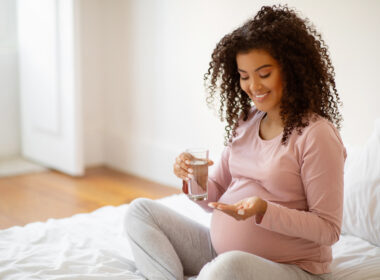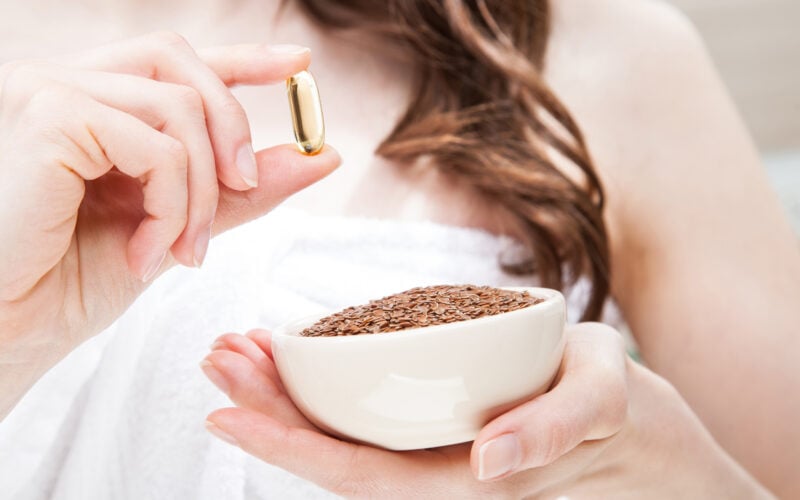When my husband and I were first trying to conceive a child, it seemed like the Internet was chock-full of suggestions for ways we could change our diet and lifestyle in order to naturally boost our fertility. Certain supplements (like folic acid, evening primrose oil, and others) are often recommended to couples who are trying to get pregnant, or trying to overcome cycle irregularities like luteal phase defect.
After trying for a baby for over a year, we finally conceived with the help of a Fertility Awareness Method (FAM), also known as a Fertility Awareness-Based Method (FABM) or method of Natural Family Planning (NFP), and with the help of doctors certified in NaProTechnology.
Along our infertility journey using FAM and NaProTechnology, we also learned how to naturally improve our fertility through the use of various dietary supplements, multi-vitamins, and herbs for both men and women.
The following are a few supplements that may help you to naturally boost your fertility and your chances of getting pregnant—keeping in mind that you should always consult your medical provider before starting a new vitamin or supplement regimen.
Prenatal vitamins
Yes, you should start taking a prenatal vitamin even before you get pregnant! If you are actively trying to conceive, the folic acid found in prenatal vitamins is especially important for preventing neural tube defects (such as spina bifida and anencephaly) in your baby. In fact, women need 400 mcg/day of folic acid before pregnancy even occurs [1].
Still, not all prenatal vitamins are created equal, according to Marilyn M. Shannon, an expert in human physiology, biochemistry, nutrition, and fertility. In her groundbreaking book Fertility, Cycles, & Nutrition, Shannon gives specific examples of vitamins that have been specially formulated to support a woman’s fertility cycle—something that very few vitamins can adequately do.
Shannon specifically recommends Optivite PMT (and its male counterpart, Androvite, for men whose wives are trying to conceive), Professional Prenatal Formula, or ProCycle PMS as the most complete multi-vitamins a woman can take to naturally boost her fertility. These vitamins will do a great job of improving fertility—which will prepare your body to conceive and have a healthy pregnancy—but you needn’t wait until you’re thinking about trying for a baby to start taking them.
(Note: These brands can be found at a few different online retailers, but are generally the most affordable when purchased from the trusted online pharmacy American Pro-Life Enterprise.)
Flax or fish oils
Both flax oil and fish oils are high in Omega 3 essential fatty acids, which are—you guessed it—essential for good reproductive health for both women and men. It is believed that Omega 3 fatty acids may help improve egg quality and lower inflammation throughout the body, both of which help promote conception and a healthy pregnancy [2].
Omega 3 fatty acids also may help improve cervical mucus quality (the substance produced by the cervix that nourishes sperm and helps them to reach the egg). Omega 3 fatty acids may also promote an ideal balance of reproductive hormones. For men, Omega 3 fatty acids like those found in flax and fish oils are essential for healthy sperm and semen production.
In the completely revised 5th edition of Fertility, Cycles & Nutrition, Shannon remarks that she “found flax oil very helpful to many reproductive problems,” such as premenstrual syndrome or PMS, heavy/painful/long periods, endometriosis, luteal phase deficiency, low thyroid function, and polycystic ovary syndrome or PCOS. Many of these issues are also associated with infertility or trouble conceiving, so healing these root causes may also help combat infertility.
Vitex / Chasteberry extract
Vitex (also known as chasteberry extract) may help improve a woman’s fertility by raising her progesterone levels and lengthening cycles that are shortened due to luteal phase defect—a common underlying cause of infertility. In a study of 52 women with luteal phase defect, chasteberry extract helped elevate progesterone levels and lengthen the luteal phase of their respective cycles [3]. In a separate study, 53 infertile women were given the nutritional supplement Fertility Blend—a chief component of which is chasteberry extract—and saw an increase in days-per-cycle with elevated basal body temperatures [4]. (Low basal body temperature can be a hallmark of luteal phase defect or low thyroid function, both of which can make it difficult to conceive.) Because chasteberry extract may help balance hormone levels—including lowering levels of elevated prolactin—it may also be effective at combating PMS and infertility [5].
Evening primrose oil
Evening primrose oil (EPO) is derived from the seeds of the flowering plant known as the “Evening Primrose.” EPO is a natural source of Omega 6 essential fatty acids, which means it may help naturally boost fertility by improving the quality and increasing the quantity of your cervical mucus. Omega 6 essential fatty acids may also promote proper hormone balance, which may in turn help with other reproductive issues like PMS. But because of EPO’s effects on the uterus, you must be careful to only take this supplement before ovulation, which you can easily target if you’re charting with a Fertility Awareness Method (FAM). Yet another reason to be in-tune with your cycle before trying to conceive!
You may find that some (or all) of these supplements are helpful for naturally improving your fertility and thereby increasing your chances at conception. Be sure that you do not start a new supplement regimen without first consulting your medical provider, as some supplements may interact with each other (or any other medications/supplements you are taking), and because it is possible to overdose on certain things, like fat-soluble vitamins. Some, like evening primrose oil, require the direction of a medical provider to ensure they are being taken at the correct time during your cycle.
Lifestyle changes for promoting healthy fertility
Of course there are also simple lifestyle changes that also guard against infertility and subfertility, such ask exercising moderately and regularly, decreasing sugar, alcohol, and caffeine intake, eating a well-balanced diet with healthy fats, colorful fruits and vegetables, and whole, minimally (or unprocessed) grains, as well as taking good care of your gut, and getting a good night’s sleep. Managing your stress levels and emotional health are both important ways to promote healthy fertility, too. If you are struggling with the emotional impacts of infertility, Organic Conceptions is a program that helps couples manage the emotional stress of trying to conceive. As a bonus, Organic Conceptions works very well in conjunction with FAMs. It is also very important to be gentle with yourself, and to remember that even the “perfect” diet and all of the “right” supplements might not be the answer to all of your reproductive issues.
With the guidance of a medical provider trained in Fertility Awareness Methods for achieving pregnancy, such as NaProTechnology or FEMM, you will be in the best position possible for navigating the nutritional, emotional, and physiological aspects necessary for healthy fertility.
References:
[1] Folic Acid Helps Prevent Some Birth Defects. [online] Center for Disease Control and Prevention. Available at: https://www.cdc.gov/ncbddd/folicacid/features/folic-acid-helps-prevent-some-birth-defects.html#:~:text=CDC%20urges%20all%20women%20of,are%20anencephaly%20and%20spina%20bifida [2] Nehra, D., Le, H., Fallon, E., Carlson, S., Woods, D., White, Y., Pan, A., Guo, L., Rodig, S., Tilly, J., Rueda, B. and Puder, M., 2012. Prolonging the female reproductive lifespan and improving egg quality with dietary omega-3 fatty acids. Aging Cell, 11(6), pp.1046-1054. Available at: https://pubmed.ncbi.nlm.nih.gov/22978268/ [3] Fugh-Berman, A., 2003. Complementary and alternative medicine (CAM) in reproductive-age women: a review of randomized controlled trials. Reproductive Toxicology, 17(2), pp.137-152. Available at: https://pubmed.ncbi.nlm.nih.gov/12642146/ [4] Westphal, L., Polan, M. and Sontag Trent, A., 2006. Double-blind, placebo-controlled study of Fertilityblend: a nutritional supplement for improving fertility in women. Clinical and Experimental Obstetrics & Gynecology, 33(4), pp.205-8. Available at: https://pubmed.ncbi.nlm.nih.gov/17211965/ [5] Seidlova-Wuttke, D. and Wuttke, W., 2017. The premenstrual syndrome, premenstrual mastodynia, fibrocystic mastopathy and infertility have often common roots: effects of extracts of chasteberry (Vitex agnus castus) as a solution. Clinical Phytoscience, 3(1). Available at: https://clinphytoscience.springeropen.com/articles/10.1186/s40816-016-0038-zAdditional Reading:
3 Simple Nutrition Tips that Will Improve Your Reproductive Health
How Whole30 Helped Me Manage my PCOS and Overcome Infertility
“Is infertility treatable?” and other questions: A Natural Womanhood Infertility FAQ
Is There a Link Between Gluten Consumption and Infertility?
This article was originally published on July 14, 2018 as written by Grace Emily Stark. It has since been updated by Natural Womanhood to offer more resources. Last updated March 11, 2021.







